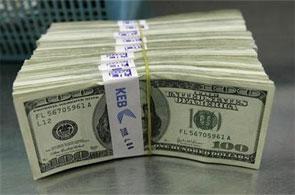The move could streamline capital flows and help finance current account deficit
The government might further ease the norms for raising funds through the external commercial borrowing (ECB) window, particularly for low-cost housing and infrastructure sectors like telecom and ports. This would make it easier for Indian companies to access cheaper funds abroad.
 Finance ministry and Reserve Bank of India (RBI) officials are likely to meet this week to consider relaxation in ECB norms for these sectors, to streamline capital flows into the country, at a time when the widening current account deficit (CAD) has become a reason for the government’s worry.
Finance ministry and Reserve Bank of India (RBI) officials are likely to meet this week to consider relaxation in ECB norms for these sectors, to streamline capital flows into the country, at a time when the widening current account deficit (CAD) has become a reason for the government’s worry.
“ECB liberalisation takes care of financing of deficit. We will have a meeting shortly to consider relaxing the norms,” a finance ministry official who did not wish to be named told Business Standard.
Under the ECB route, borrowers can raise dollar-denominated loans directly from international banks, international capital markets, multilateral financial institutions like IFC and ADB, export credit agencies, suppliers of equipment, foreign collaborators and foreign equity holders.
An ECB window of $1 billion was made available for low-cost housing in December 2012. Though there are two views on whether or not the limit should be increased this year - since it was set only in the latter part of last year - the government might relax some conditions for availing of credit through the ECB window.
Some companies had raised concerns over not being able to tap the route, as stringent conditions, such as the requirement of a minimum paid-up capital, net owned funds, and end use, prohibited some international lenders from lending to them. Liberalisation of ECB norms would allow more companies to avail of the facility for fund-raising activities - at a time when interest rates abroad are significantly lower.
“At present, ECBs can be availed of against imported equipment. We have requested the government to allow it against any equipment,” said Srei Infrastructure Finance CMD Hemant Kanoria.
An official said the government wanted to address the problems of the manufacturing sector; funds raised through ECBs could help push investment and exports. Dollar inflows could also help finance CAD, which had widened to 6.7 per cent of GDP in the October-December quarter last financial year.
According to the latest data available with RBI, ECBs of $2.1 billion were raised in February 2013, against $2.6 billion in the corresponding month the previous year.
For ECB up to $5 million, to be eligible as a recognised lender under the automatic route, a foreign equity holder requires at least 25 per cent holding of paid-up equity in the borrower company.
At present, ECBs can be raised for investment such as import of capital goods, new projects, and modernisation or expansion of existing production units. A company can raise a maximum of $750 million as ECB in a financial year. Companies in the services sector, such as hotels, hospitals and software firms, are allowed to avail of ECBs up to $200












 © 2025
© 2025